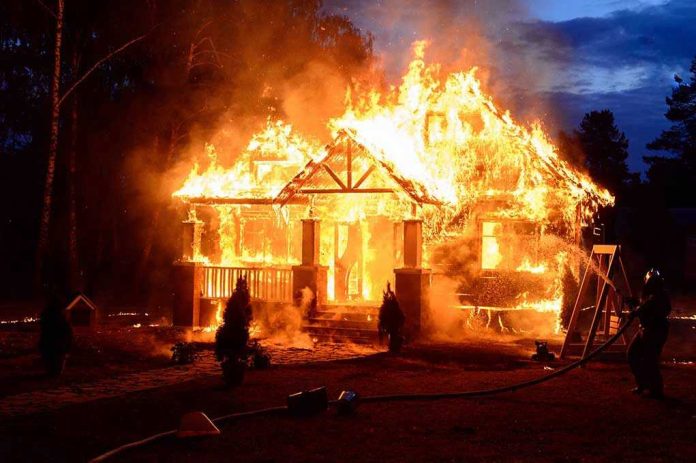
A shocking act of vigilante justice in upstate New York has reignited debate over personal accountability and the failures of progressive crime policies, after a 5-year-old boy lost his life in an arson allegedly set as retaliation.
Story Snapshot
- Taquida Hendrix stands trial for murder and arson after allegedly setting a Rochester home ablaze, resulting in the death of a 5-year-old child.
- Prosecutors rely on testimony from co-defendants who accepted plea deals and admitted their roles in the crime.
- The tragedy was reportedly a misguided act of retaliation, but the child victim was not the intended target.
- The case highlights ongoing concerns about community safety, plea bargaining, and the consequences of unchecked vigilantism.
Arson as Retaliation: The Tragic Sequence of Events
On the night of July 28–29, 2024, a two-story home on Portland Avenue in Rochester, New York, became the site of a fatal fire allegedly set by Taquida Hendrix. According to investigators, Hendrix, along with her sister Tiakayla and Roy Chambers, planned the arson as an act of retaliation for an earlier attack on their father. Gasoline was poured on the porch, and the fire was ignited while 5-year-old Malakai Stovall slept inside with his babysitter. The boy suffered burns over 75% of his body and later died at Strong Memorial Hospital. This incident not only devastated a family but also shook the broader Rochester community, raising urgent questions about the proliferation of personal retribution and its deadly consequences.
Law enforcement quickly identified the suspects, and both Tiakayla Hendrix and Roy Chambers pleaded guilty to arson in August 2024. By September 2025, Taquida Hendrix faced trial on charges of murder and arson. The prosecution’s strategy hinges on the cooperation of the co-defendants, who agreed to testify against Hendrix as part of their plea agreements. These developments underscore the complexities of criminal cases involving multiple participants, especially when plea deals are used to secure convictions. The reliance on co-defendant testimony illustrates how prosecutors often navigate challenges in assembling direct evidence, while also raising questions about the incentives and reliability of such arrangements.
Stakeholders, Power Dynamics, and Emotional Fallout
The principal figures in this case include Taquida Hendrix as the defendant, her sister and co-defendant Tiakayla, Roy Chambers, and the bereaved family of Malakai Stovall. The Monroe County District Attorney’s Office leads the prosecution, leveraging the cooperation of the co-defendants to build their case. Defense attorneys face significant hurdles, given the guilty pleas and willingness of former accomplices to testify. The emotional weight carried by Malakai’s family and the local community is palpable, as their presence in court has influenced both public perception and the atmosphere of the proceedings. This tragedy has amplified calls for justice, closure, and measures to prevent similar incidents in the future.
Community safety and the specter of vigilante justice have taken center stage as this trial unfolds. The incident, rooted in a misguided attempt to retaliate for a prior assault, resulted in a wholly innocent child’s death. Such cases highlight the dangers of individuals taking the law into their own hands, especially in neighborhoods already grappling with safety concerns. For conservatives, the story serves as a stark reminder of the broader social consequences unleashed by lenient crime policies and the erosion of respect for law and order. The ripple effects are felt not just by those directly involved, but by all residents who demand a safer, more accountable society.
Current Trial Developments and Legal Strategies
As of September 2025, Taquida Hendrix’s trial is underway in Rochester. Opening statements have been delivered, and nearly 30 witnesses—including first responders, investigators, and the co-defendants—are scheduled to testify. The prosecution has already outlined the scope of the trial and emphasized the importance of co-defendant testimony and thorough evidence collection. Meanwhile, the defense aims to challenge the credibility of these witnesses and the narrative presented by the state. The jury’s task is complicated by the emotional gravity of the case, as well as the detailed accounts provided by police and fire officials. Limited discrepancies in reporting, such as the exact date of the fire, do not detract from the overwhelming consensus on the facts and sequence of events.
The ongoing proceedings have drawn significant media attention, reflecting both the unusual circumstances of the case and the broader implications for criminal justice in America. The outcome will set precedents not only for how retaliatory acts are prosecuted, but also for the use of plea deals and co-defendant testimony in cases involving fatal consequences. This trial will likely prompt renewed scrutiny of policies governing violent crime, arson, and child safety, as well as the effectiveness of current legal frameworks in delivering justice and deterring future tragedies.
Broader Impact, Policy Implications, and Conservative Perspectives
The death of Malakai Stovall and the subsequent trial have immediate and lasting effects. For the family, the loss is incalculable, and for the community, trauma and calls for justice remain at the forefront. In the long term, this case may influence legislative debates about arson sentencing, plea bargaining, and community safety. The social and economic costs of emergency response, investigation, and court proceedings further fuel public demand for stricter accountability and more robust deterrence. Many conservatives view this tragedy as symptomatic of deeper failures in progressive criminal justice policies—failures that prioritize offenders’ rights over those of innocent victims and law-abiding families. Heightened awareness of retaliatory violence and child safety will almost certainly shape future discussions about restoring order, protecting families, and rejecting agendas that undermine constitutional values and public trust in the rule of law.
Sources:
NY Woman Intentionally Sets Home on Fire with 5-Year-Old Inside; Murder Trial Underway
Woman accused of starting fire that killed 5-year-old goes to trial
Woman accused of setting fire that killed boy, 5, could enter plea on Tuesday
5-year-old boy’s family faces accused killer in court as testimony begins in trial
Opening statements expected in trial of woman accused of intentionally setting deadly fire



